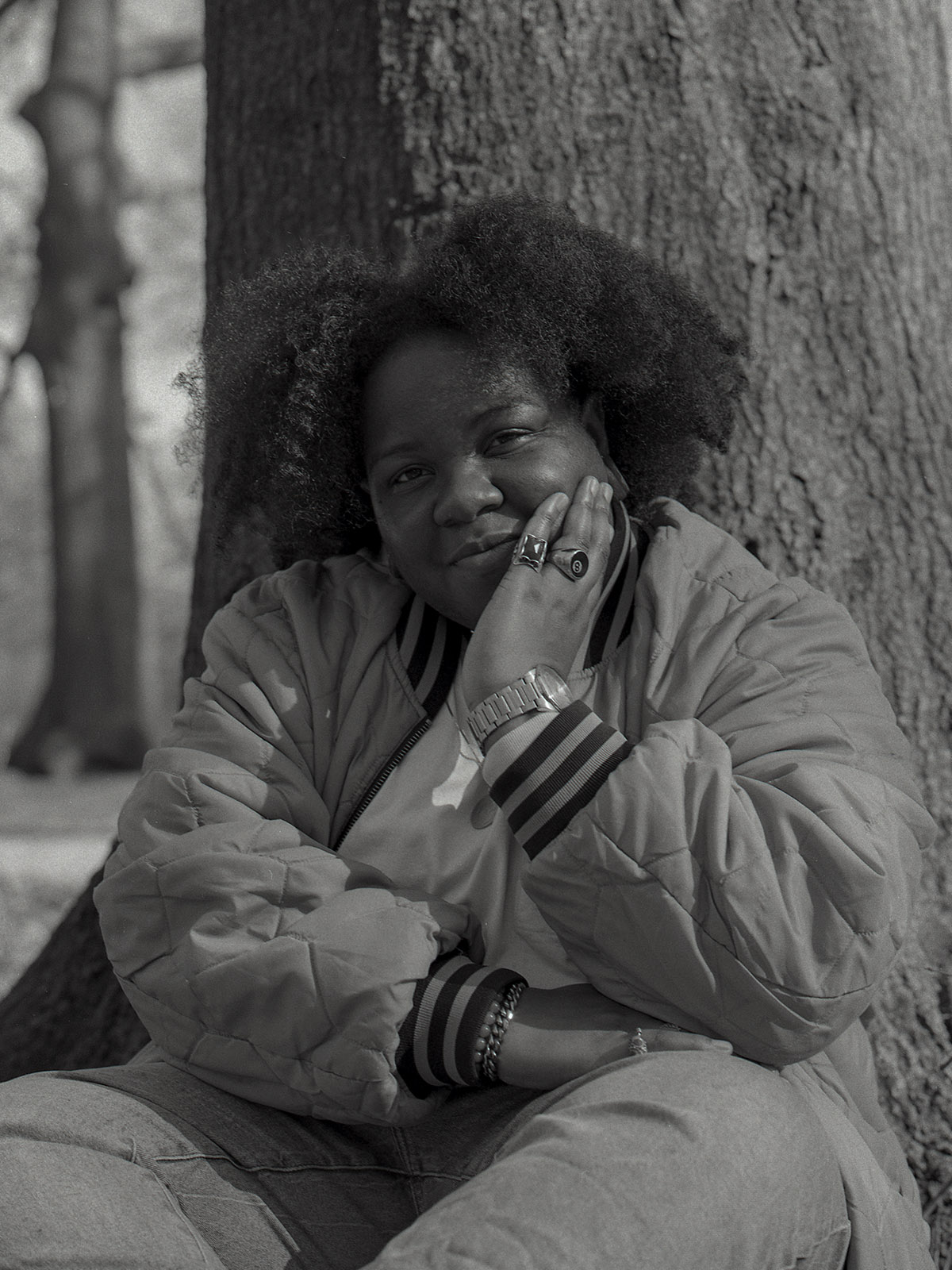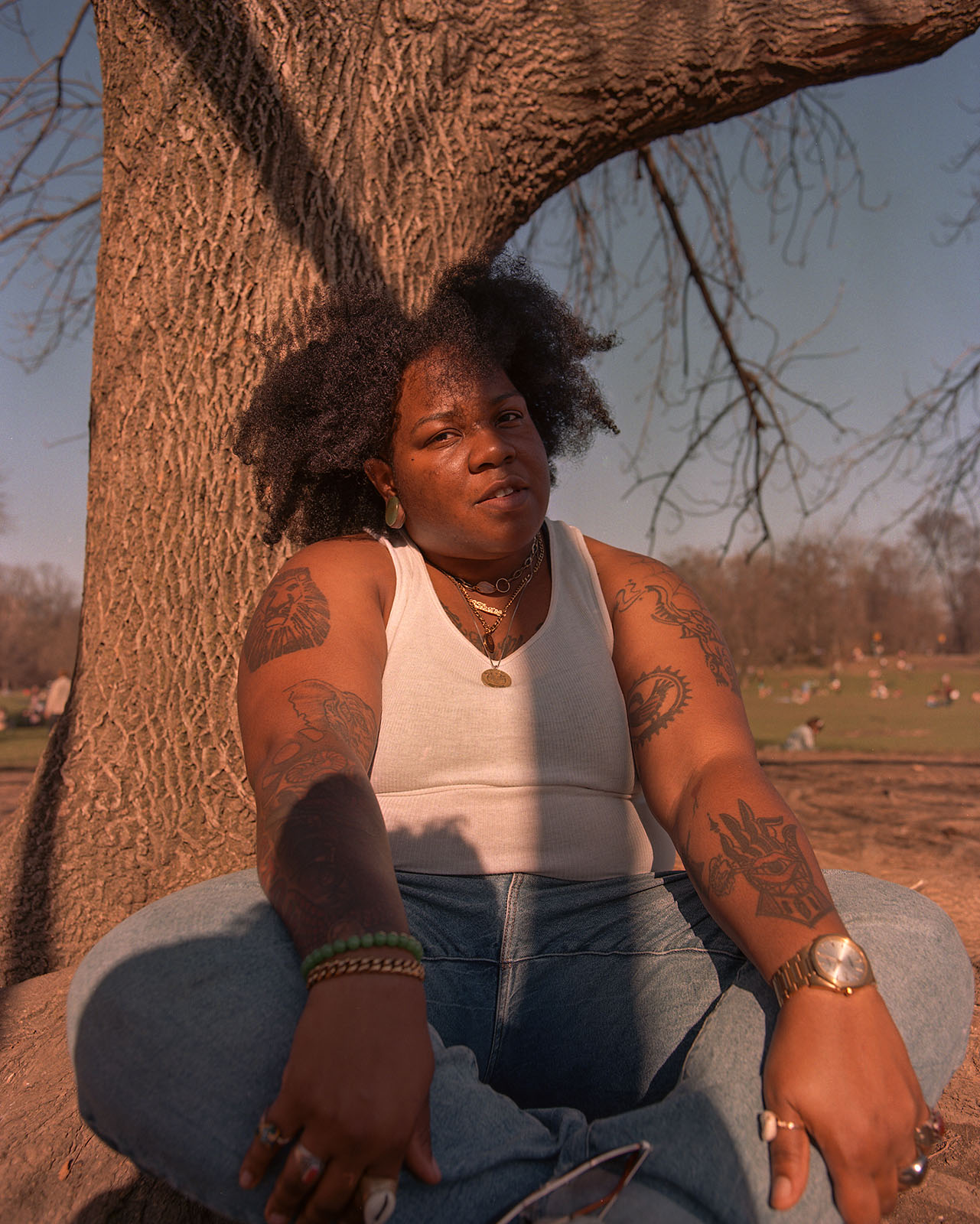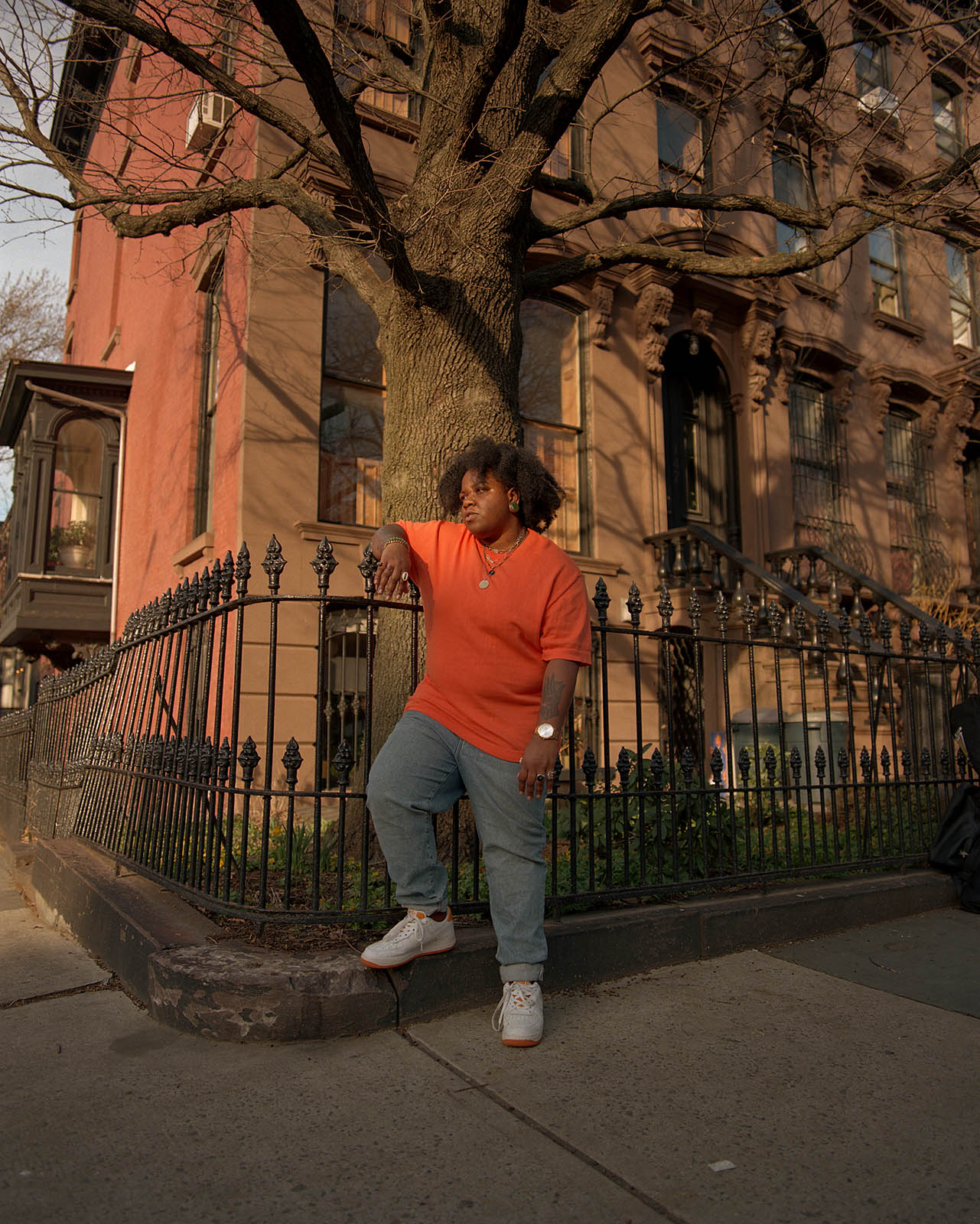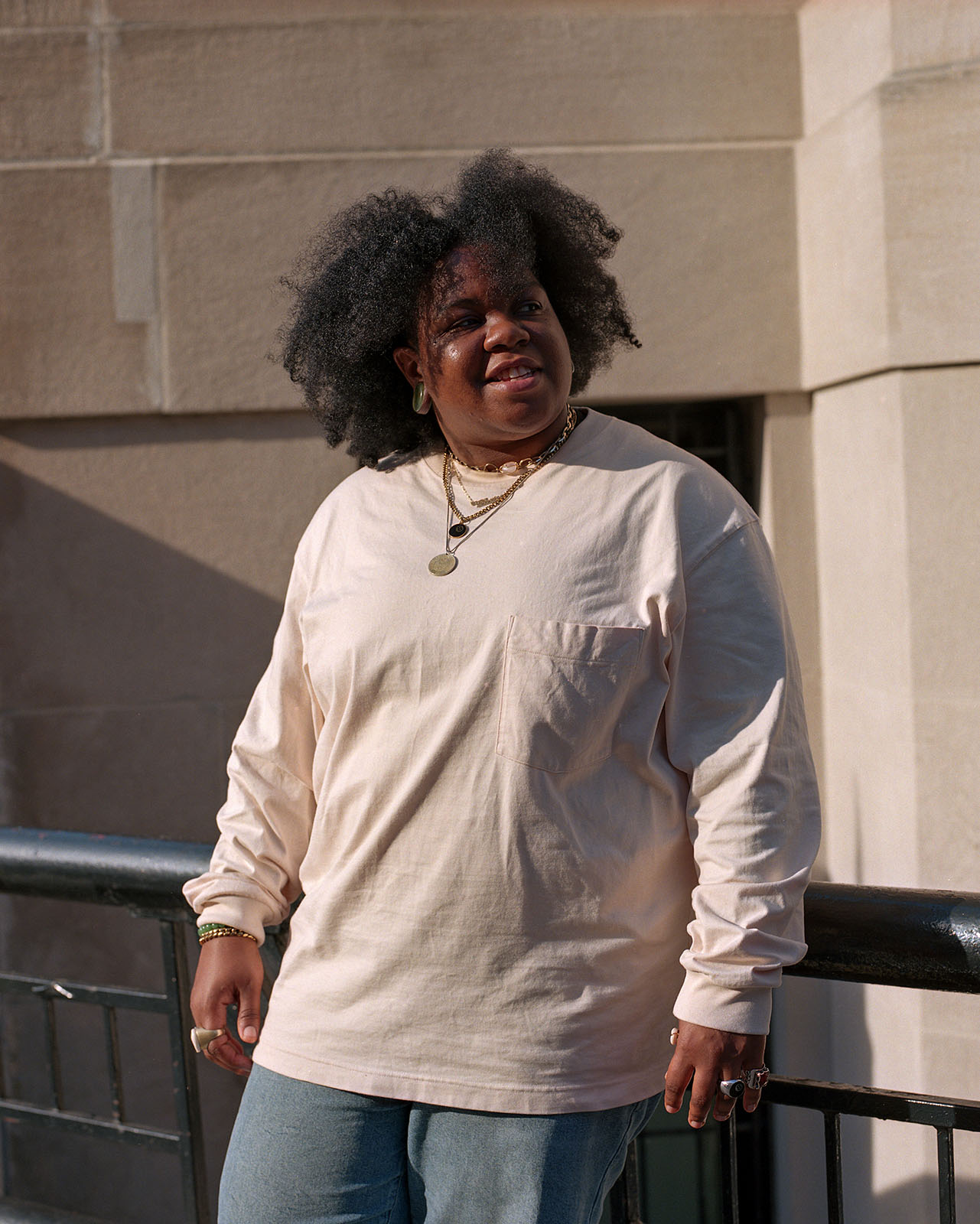The DJ and producer met with Document to speak on her upcoming EP ‘Channel 8,’ a love for ’90s throwbacks, and how to throw a good party
“I’m watching for people dancing, for people throwing their head back, screaming with their hands in the air,” says DJ and producer Boston Chery. We’re having fruity cocktails at a Thai place she likes—the owner smiled and waved when she walked through the door. “Just people being free on the dance floor.”
That’s the hallmark of a good DJ, in Boston’s view: the ability to read a crowd, and to act accordingly. To find that slim balance between setting a mood, and adapting to it once it gains its own life. The first time I saw Boston perform was at the Brooklyn Museum, outside on the plaza steps. It was Saturday in early May, walking distance from where she grew up in Crown Heights—a full-circle moment, she notes. Although it was daytime, and there was still a chill in the air, people were stopping by to say hello, to dance for a bit, to lie in the sun and listen.
Everybody knows Boston in one way or another. She’s hosted some iconic parties, produced some killer remixes, and worked with plenty of famous names and platforms: Kaytranada, Jill Scott, Goldlink, Afropunk, Boiler Room, to name just a few. Her sets are first-rate on their own—stacked with ’90s hits and Afrobeats, references to her Haitian roots—but even better in context. Boston knows community. She has it behind her, and creates a microcosm of it wherever she goes. You can see it in the crowd she pulls—New York cool kids, creative types, who really know one another and exude positive energy—and then, in her love and respect for the sound that came before her.
“The Caribbean Day Festival would literally pass in front of my house. I would hear people blasting music in their speakers, back when your neighbors weren’t complaining,” she remembers. Boston was born in Massachusetts—you can tell from her accent—but calls Brooklyn home. “Being in New York, you hear so much music from before your time. That melting pot kind of created my sound.”
I caught her a couple weeks ago, just as her career takes new direction; Boston Chery is set to release an original EP this summer, called Channel 8. For Document, she speaks on working directly with artists, the healing powers of nostalgia, and breaking bread with friends by way of the party.
Morgan Becker: How did you start DJing, and who taught you what you know?
Boston Chery: I started DJing in college, my sophomore year when I turned 19. I used my financial aid to get a MacBook Pro and I took it everywhere with me. I was playing music everywhere, from the beach to McDonald’s—this is back when I used to eat McDonald’s, I don’t anymore [laughs].
I actually reconnected with one of my friends from elementary school. I used to go to his house all the time. His mom was the person who told me that I should become a DJ. She’s literally known me since I was five years old. She just realized how much I love music, and how passionate I am with it. She put that in my ear, and it just clicked with me.
But who taught me how to DJ? YouTube University [laughs]. I learned a lot with YouTube. A lot of DJs online, a lot of DJ friends at the time, took me in and showed me how to use turntables. I kept learning more and more—I met people like Natasha Diggs, who connected me to the people at the Serato headquarters, where they actually showed me all the different [types of] equipment they have. They just put me on to so much. From there, to my community.
Morgan: Did production and DJing go hand in hand?
Boston: I was actually producing back in high school. I took a TV production class—we had to use Soundtrack Pro to put music underneath the videos. I was using those same loops to create my own beats.
Morgan: Tell me about the process of creating a set. Do you prepare something specific for every event, or work from some basic template, or is it somewhat spontaneous?
Boston: Each gig is definitely specific. It depends on the vibe that I want to bring, and also the vibe of the people in the party. I used to do playlists—and sometimes I still might have a playlist—but because I’ve been DJing so long at this point, I’m just going from the top, reading the crowd. Going off the energy of the crowd. Seeing what makes them go crazy, and giving the same vibe. Then I get a little experimental, like, ‘How do you feel about, you know, Crystal Waters’ Boston Chery does it all, with the Brooklyn community behind her
100%?’’ Like, let’s see how you do with that!
Morgan: What are you trying to gauge in the crowd? What are you watching for?
Boston: I’m watching for people dancing, for people throwing their head back, screaming with their hands in the air. Just people being free on the dance floor, having a good time. I want to give them that [moment] when they wake up tomorrow, like, ‘Yo, that party was crazy.’
“I like to play Black music. Music that comes from the diaspora. Music that just feels good, that just kind of wakes up people’s souls.”
Morgan: Would you say that a DJ is responsible for making a ‘good’ party?
Boston: Oh, yeah. There’s no party without a DJ. I mean, you could put a playlist on—but even the person who’s creating the playlist is [essentially] DJing. If a person’s just playing off their phone—you know, not to say, ‘Hire someone who’s gonna play music off their phone’—but they’re literally creating the whole vibe.
[‘Ronan’ by Taylor Swift plays over the speaker] Imagine a DJ is, like, just spinning this. [Laughs] Some people might like it, some people might be like, ‘Wow, we’re just gonna go and enjoy music like this?’
Morgan: You mentioned you were taught by Natasha Diggs, and I heard that you were mentored by MeLo-X, as well. What have been some of the more important takeaways from those relationships?
Boston: MeLo, he really affirmed the idea of mixing a lot of different music together, and not boxing myself in as a specific genre of producer. Once he told me that, I never looked back. People ask me, ‘What kind of DJ are you?’ At this point, I’m telling people I’m an open-format. And they’re like, ‘What’s that?’ That means I play everything. I learned that from MeLo.
Natasha, she really taught me how to have fun with it. She has this party called Soul in the Horn. She created something that wasn’t there before—this whole space of people listening to music with horns in it. She created a space for all of these break dancers and hip-hop heads and disco heads. I learned about cultivating spaces through her.
Morgan: What kind of music do you gravitate towards?
Boston: I always say that I’m an R&B baby. I love music that has deep, heavy basses, with groovy or swinging drum patterns. That’s what I listen to when I’m home. For parties, I definitely still go for the heavy bass and the drums, but [I play] more cultural music—a lot of Afrobeats and throwbacks, because for me, that’s also culture.
I like to play Black music. Music that comes from the diaspora. Music that just feels good, that just kind of wakes up people’s souls.
Morgan: You once said, ‘Nostalgia heals,’ in reference to your love for ’90s music. I loved that statement.
Boston: When you play a song that [people] haven’t heard in such a long time, they’re like, ‘Oh my god, that takes me to this place.’ They’re all smiling and happy and feeling good, and they’re experiencing all those memories. Just imagine having a bad day and then hearing a song that’s taking you to a really good place. It’s actively healing you, whatever you’re feeling at the moment.
Morgan: Do you think that relates to your desire to make remixes? What kind of feeling are you going for there?
Boston: A nostalgic feeling with something new, putting my own twist on it. I really like a lot of sampled music. I really like the whole Diddy Bad Boy era. Even the Death Row era. All the stuff they sampled, like—just to watch how they took these songs and created hits… I kind of do the same thing, and turn them into dance records.
Morgan: You grew up between Boston and New York—do you think that kind of dual influence had an impact on your sound?
Boston: I don’t know if Boston really influenced my sound. [Laughs] So sorry, no shade.
But growing up in ’90s Brooklyn, and being in Crown Heights, the Caribbean Day Festival would literally pass in front of my house. I would hear people blasting music in their speakers, back when your neighbors weren’t complaining. You could hear them across the hall, the music they would listen to.
I remember growing up listening to KTU a lot—the station where you’d find a lot of ’90s electro house music. Being in New York, you hear so much music from before your time. That melting pot kind of created my sound. I still love Madonna. I love Crystal Waters. I love LL Cool J. I love Brandy. I love, you know, Sean Paul, Beenie Man’s music. So many different sounds.
Morgan: You’re in the process of releasing an EP. Could you tell me about that process?
Boston: You know, I never understood why albums would take two or three years. I didn’t understand that until now [laughs]. Because here I am—I made a lot of these records last year. But now, you know, I’m working on finally releasing it.
The process has been great. I’ve learned a lot through the artists I’ve been working with. They’ve helped me learn how to structure music—to their verses, to their voice. I’m very grateful to the artists who are on the tracks. I’m super excited, like, I just know all the doors are gonna open from here.
Morgan: Have you been wanting to make original music for a while?
Boston: Ever since I was a child. Ever since I fell in love with music at seven years old. I remember watching Moesha and seeing Brandy, and knowing who she was. Being a young girl and seeing another Black dark skin girl on TV, I was like, ‘Wow.’ And hearing her music—hearing the sounds of Darkchild, who was her producer at the time—I was like, ‘Wow. I want to be like him. I want to be like her. I want to create for people.’
Missy Elliott, too, was another big person—knowing all the songs that she wrote for the different artists that she worked with. I always knew as a child, like, ‘That’s something I want to do.’ To be able to do that now feels so amazing.
Morgan: What parties are you working on now? Which have been your favorites?
“I still love Madonna. I love Crystal Waters. I love LL Cool J. I love Brandy. I love, you know, Sean Paul, Beenie Man’s music. So many different sounds.”
Boston: I’ve worked on so many parties; what has helped me grow as a DJ is throwing parties. I remember this one time, I had one in Crown Heights-Flatbush. We had [a lot] full of people. We created a stage for performers, we had jerk chicken going on. We had, like, three hundred people outside. Police shut it down. It was one of the best that I’ve thrown. A lot of the parties that I’ve done weren’t even at clubs, to be honest with you. It was giving throwback New York.
Right now, I’m working on a party called Global Warming with ADAIR, my friend Trae, and my friend Tip. We’ve been curating a space for BIPOC queer people in Brooklyn, and it’s just been really, really lit. I’m doing a party called Club 888 for my label, The 8th Path—the first party we had iMarkkeyz and Astro Raw at Dumbo House. I also have My Type of Party with Tru Violet, that’s going on right now.
Morgan: What’s it like running parties with friends?
Boston: All of the parties I’ve ever thrown have been with friends. It’s been a pretty amazing experience. It just feels like breaking bread with family—creating memories with family. It’s so fulfilling, so fun. I’m grateful that I’ve always had a great community to look out for me, and to just build with me.
Morgan: How do you find balance between work and personal life? I imagine that they can become pretty intertwined, working mostly on the weekends and nights.
Boston: I think I’ve just accepted that I have a different life. My balance is gonna look a little different from everyone else’s. I don’t really know, but I’m doing it, I’m here.













